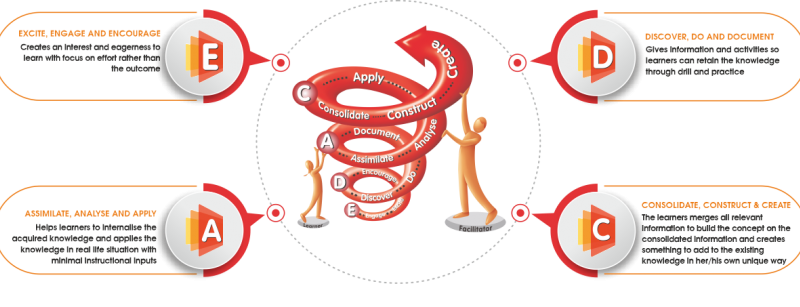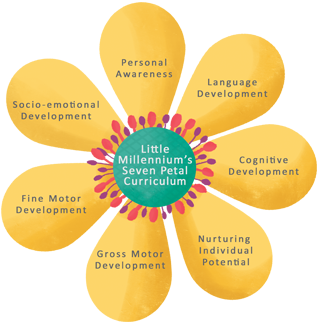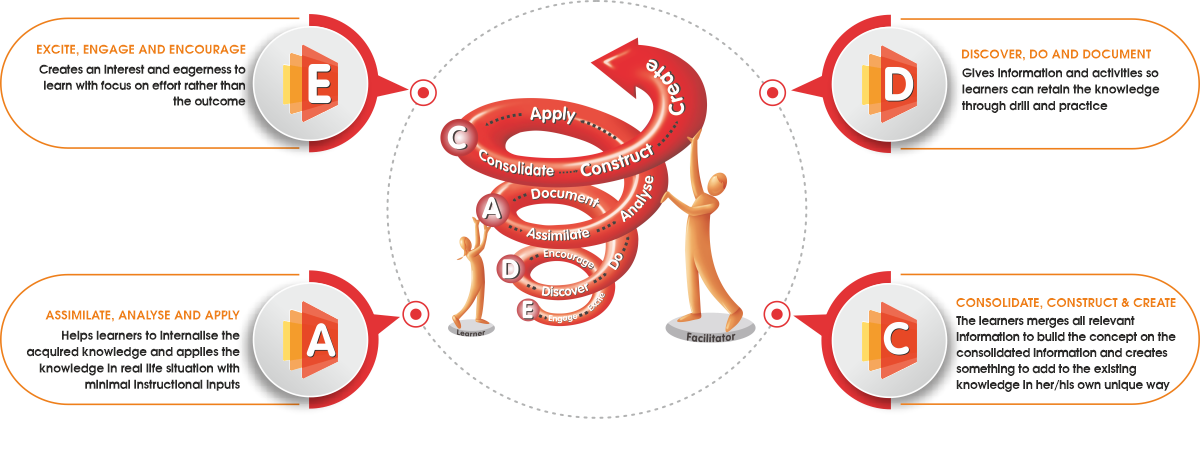
E-DAC CONTINUOUS LEARNING SPIRAL
Curriculum
takes a learner through the 4 fold learning process which is signified in each letter
The driving force behind the Takshila schools is its progressive learning system, E-DAC. The sole aim of this learning system is to make learning effortless and effective with the help of various audio, visual and kinesthetic learning tools and techniques. The system is innovative in its approach as it is designed to make learning an engaging and experiential process for all learners. It is the outcome of intensive research by the Research and Development division of EDAC. Though E-DAC is an acronym for the four-fold process of learning that takes a learner through various stages of learning, the process itself is a never-ending spiral, a continuum that may begin at any point but one that never ends, thus making lifelong learners.
E – Engage, Excite and Encourage the learner to learn through environment D –Discover and learn by Doing, and Document to retain knowledge A – Assimilate, Analyze and Apply knowledge and skills C – Consolidate, Construct and Create to build and add to existing learning and reach out to others
E-DAC™ is based on the belief that learning happens when attitude and perceptions are positive. Since all learners are unique, varied activities are planned to cater to their individual needs and learning styles. This ensures that learner develops a positive attitude towards the learning to be acquired. In other words this stage builds interest and curiosity with which a child will begin her journey to learn. Here, the curriculum also uses the environment—both within and outside the classroom—as a medium of teaching-learning. Therefore, the environment is made conducive through the Walls Speak concept, where even the walls of the classroom are used as teaching aids.
The learner internalizes knowledge through experience. Facilitators are equipped with the E-DAC™ teaching strategies that help the learner discover and learn through three phases- guided learning (gaining knowledge on a given topic), problem based learning (learning by doing) and expository learning (documenting the learning experience). It provides creatively designed textbooks, workbooks along with skill building exercises and projects for the learner to encourage the spirit of discovery and enquiry. With every discovery the learner pauses to internalize and then documents his/her learning in his /her unique style.
Learning does not stop with merely acquiring knowledge. The most effective learning occurs when a learner is able to use acquired knowledge meaningfully. It is important to note that from this stage the learner starts the ‘processing of learning’. Learners are assigned with the context-specific tasks where they apply their newly acquired knowledge. This stage requires higher order thinking skills in which the learner begins to think on his/her own and puts the knowledge gained to practical use. Here, E-DAC™ introduces the learner to problem solving as well as builds life skills through exciting real life situations.
E-DAC ensures that the mind acquires knowledge for life through its various sequential stages & allows the learner to make constructive use of the existing knowledge. Its aim is to help the learner create and exhibit something new in the form he/she is comfortable with, so that it is useful to the society. This paves the way for the students to evolve and progress.
LITTLE MILLENNIUM LEARNING SYSTEM
Little Millennium has a well-researched, award winning and scientifically developed preschool curriculum that focuses on holistic development of every child, through play activities and collaborative group work. The curriculum aims at providing children with a solid academic foundation by implementing a multi-sensory integrated approach to education. Little Millennium has been at the forefront of bringing innovative products in the early child care space in India. Over the years we have won numerous awards including the "Best National Chain" for "Innovation in early childhood education” at the Indian Education Awards, 2013.
Some of the key objectives of our award winning
Preschool curriculum include:
To enable, energies and enhance childhood by fostering complete growth of mind, body and spirit.
Use sequential learning techniques to ensure holistic development of every child across key skill areas
To ensure that children receive attention to their physical, mental and emotional needs
• Seven Petal Curriculum:
At Little MillenniumTM Preschool, we follow the proprietary ‘Seven Petal’ approach, which ensures the holistic development of every child, through play activities & collaborative group work. The curriculum focuses on seven key development areas for children: cognitive development, fine motor skills, gross motor skills, language development, personal awareness, socio-emotional development & nurturing individual potential.

• ECLECTIC APPROACH:
Our proprietary Seven Petal Curriculum follows the Eclectic Approach that takes the relevant strategies and methodologies from multiple schools of thought on early childhood. The Instructional Procedure for two to six year old children has been designed to provide research-based strategies that ensure high quality learning standards and outcomes. The curriculum is based on the following schools of thought which are the basis of the best practices of Little Millennium.


